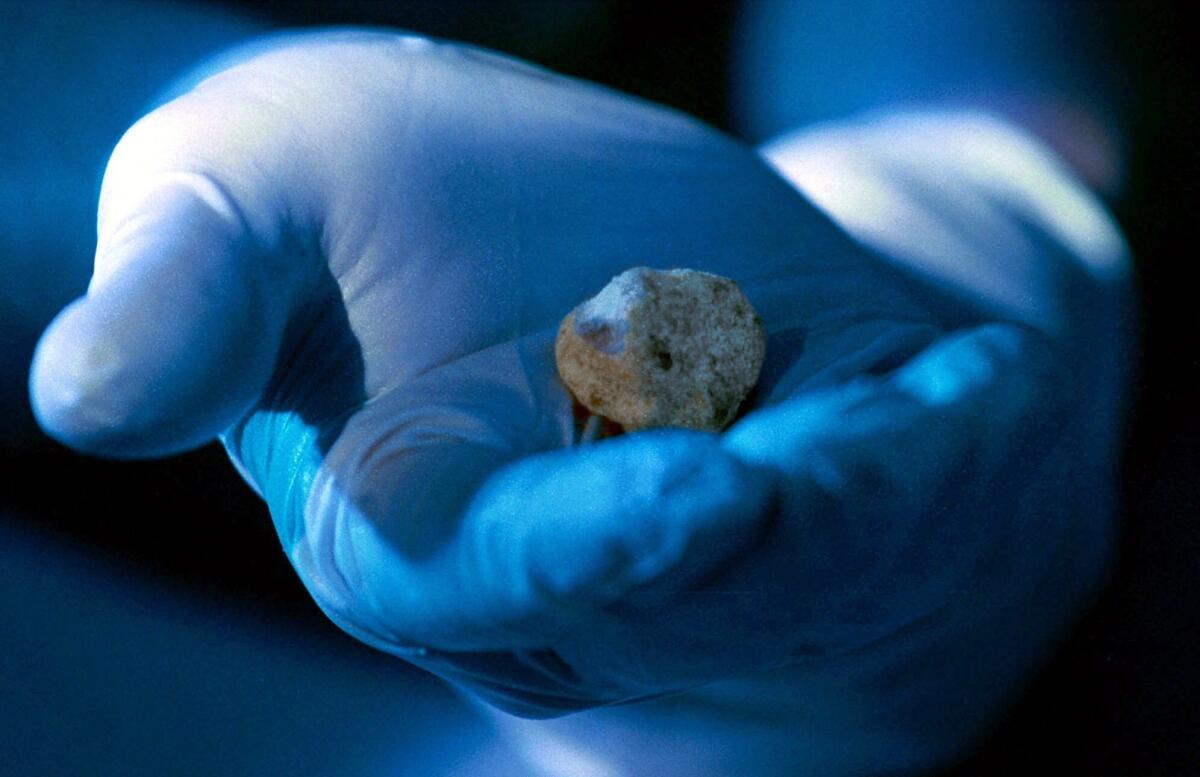Drug seizures soar in China; most suspects are ‘farmers and unemployed’

A police officer on May 8, 2001, holds 5 grams of methamphetamine confiscated in a raid in Rochester, Minn.
- Share via
Reporting from Beijing — Seizures of illegal drugs jumped almost 50% last year in China, authorities said Thursday, with young people and rural residents showing an increasing appetite for meth, crystal meth and other amphetamine-type stimulants.
China said it “solved” 165,000 drug-crime cases nationwide in 2015, up 13.2%, with the number of arrests up 15% and the quantity of drugs confiscated up by almost half, to 102.5 tons, compared with 2014’s figure, according to Liu Yuejin, vice commissioner of the China National Narcotics Control Commission.
The drug trade, added Liu, is becoming increasingly violent. In a country where firearms are strictly controlled and relatively difficult to obtain, police seized 466 guns last year in drug cases, up 40%, along with 30,000 rounds of ammunition.
Almost 80% of drugs seized were manufactured in China, with most of the rest coming from the “Golden Triangle” where Myanmar, Laos and Thailand converge, and the “Golden Crescent” comprising Iran, Afghanistan and Pakistan.
Headline-grabbing busts have happened across the country, though many of the biggest cases have been concentrated in southern provinces such as Guangdong. In January 2015, police arrested 28 suspects and seized more than 2.4 tons of solid and solid-liquid meth in a factory near Guangdong’s Lufeng City that was supplying customers in Shanghai.
In the city of Foshan, also in Guangdong, over 700 pounds of meth and MDMA (widely known as ecstasy or Molly) were found in December, concealed in 88 containers of knockoff luxury watches at a logistics company. Last month, more than 330 pounds of meth and over a ton of raw materials were seized in the Guangdong city of Panyu, with 10 people arrested. A whistle-blower in the case collected a $69,000 reward from the police -- showing up for the ceremony in a Spider-Man mask to conceal his identity.
Heroin and opiate use is slowing in China, while synthetic drugs are booming. Of the 531,000 “newly discovered drug users” registered by China in 2015, Liu said, 80.5% were using amphetamine-type stimulants including meth, speed, ecstasy and crystal meth (also known as ice), compared with just 17.4% abusing opiates.
“Farmers and unemployed people,” said Liu, made up 78.9% of the 194,000 people arrested on drug charges.
A substantial share of the production, however, is heading overseas. This week, Australian police announced that they had discovered 50 gallons of liquid methamphetamine being shipped from China concealed in thousands of gel pads inserted into push-up bras. An additional 140 gallons traced to the same network was found among art supplies in warehouses in Sydney.
Australian police put the street value of the drugs at $900 million and said it was the largest-ever haul of liquid meth in Australia’s history. Three Hong Kong residents and one mainland Chinese man were arrested in the case.
Last May, police in Guangdong busted a 3,000-square-foot meth factory on a goose farm in the city of Yangjiang whose products were being disguised as black tea and shipped to Taiwan and Southeast Asia. Twenty-seven people were arrested, including several Taiwanese citizens. Authorities also confiscated more than 1.39 tons of solid and solid-liquid ketamine, 3 tons of other drug precursor material, along with weapons and 12 vehicles.
Australian and Chinese agencies set up a joint task force in November to investigate criminal syndicates trafficking meth.
Hu Minglang, director-general of the Ministry of Public Security’s narcotics control bureau, said China had signed counternarcotics cooperation agreements with more than 20 countries and had close law enforcement cooperation with more than 30 countries. “We are willing to take all kinds of measures to combat drugs together,” added Hu, who said he was meeting some “U.S. counterparts” on drug control and law enforcement Thursday afternoon.
American authorities have previously criticized China for failing to do enough to stop the production and export of drugs and their precursor materials.
In 2013, U.S. prosecutors named the boss of one drug-making company, China Enriching Chemistry, in a federal indictment alleging the sale of banned substances in the U.S., but China and the United States do not have an extradition treaty. The boss was arrested in China, but the company has continued to operate.
“China has a very big chemical industry, and makes a lot of precursors that might be used for drugs but not all of them are being used for making drugs,” Hu said. “If they violated Chinese law, then we took measures to punish them, and some staff.”
In October, the Chinese government restricted the export of alpha-PVP, the key ingredient in a notorious stimulant called flakka, and 115 other chemical substances used to make synthetic drugs but found to have no known legitimate uses. U.S. Drug Enforcement Agency spokeswoman Raynette Savoy Kornickey praised the move, saying that “by cutting off the supply of alpha-PVP at its origin, we hope to halt its flow into the United States.” She called China “a major supplier.”
Under Chinese law, producing, carrying or selling 50 grams or more of heroin or methamphetamine can be punishable by death.
Asked how many drug offenders were put to death last year in China, Liu refused to answer. But a report last year on China.org.cn, an official state media site, said five Japanese and four South Korean “drug related criminals” were executed in China in 2014.
Nicole Liu in The Times’ Beijing Bureau contributed to this report.
Follow @JulieMakLAT for news from China
More to Read
Sign up for Essential California
The most important California stories and recommendations in your inbox every morning.
You may occasionally receive promotional content from the Los Angeles Times.











